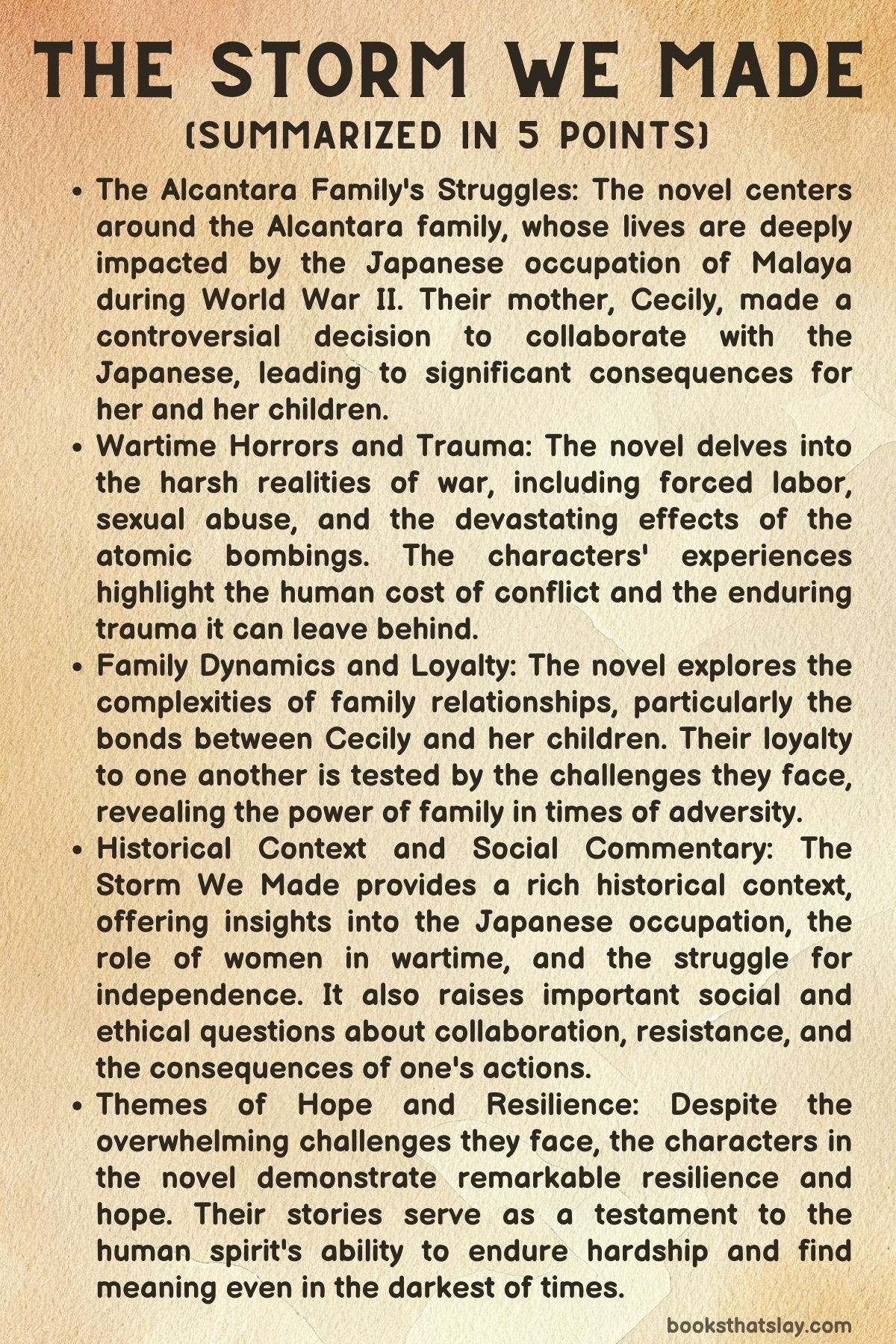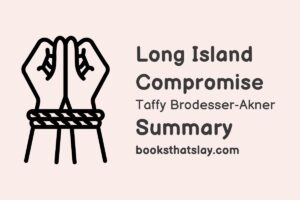The Storm We Made Summary, Characters and Themes
The Storm We Made by Vanessa Chan is a historical novel that dives deep into the complexities of family, loyalty, and the devastating consequences of war.
Set in war-torn 1945 Malaya, the novel follows the Alcantara family’s struggles amid Japanese occupation. As Cecily’s past betrayal haunts them, her children endure captivity, trauma, and moral conflict. Amid loss and devastation, their intertwined journeys reveal the profound cost of war and the enduring strength of love and resilience.
Summary
The year is 1945. As the world teeters on the edge of peace, the Alcantara family clings to the fragile remnants of hope.
Their youngest son, Abel, has disappeared without a trace. Cecily, the matriarch, lives in the shadow of her past—haunted not only by the war but by her own role in shaping its course.
Years earlier, disillusioned and yearning for freedom from domestic confines, Cecily made a fateful decision: she became an informant for General Shigeru Fujiwara of the Japanese Imperial Army.
Believing in the promise of an independent Malaya, Cecily aided the invading forces, convinced that sacrifice would pave the way to liberation.
But her choice rippled outward, unraveling the lives of those she sought to protect.
Now, each of her children bears the scars of that betrayal.
Abel, seized and enslaved by the occupiers, endures the brutal conditions of forced labor, his innocence shattered.
Jujube, the eldest, is caught in a web of conflicted loyalties, seeking comfort in the arms of a Japanese teacher while struggling with the weight of her mother’s actions.
Meanwhile, Jasmin, the youngest, remains hidden away—shielded from the horrors of the comfort stations that claimed so many girls like her.
Set against the backdrop of a war-torn Malaya, the Alcantaras’ personal tragedies unfold in tandem with seismic historical events—the bombing of Nagasaki, the suffering in prisoner-of-war camps, the systematic abuse of women.
Through the lens of this fractured family, the novel lays bare the human cost of war: the deep wounds, the moral ambiguity, and the enduring bonds that tether people together in even the darkest times.
As the war grinds to its bitter end, Cecily must face the wreckage of her choices. The family is left to reckon with loss, trauma, and a future uncertain. Yet, within the ruins, seeds of resilience emerge.
Even in a world scarred by betrayal and violence, the Alcantaras find flickers of grace, moments of connection, and the quiet courage to begin again.
In the ashes of war, this is a story of reckoning and redemption—of a family fractured by history, yet bound by love.

Characters
Cecily Alcantara
Cecily Alcantara, the matriarch of the Alcantara family, is a complex and enigmatic figure. Initially portrayed as a disillusioned housewife yearning for independence, Cecily’s involvement with Shigeru Fujiwara, a Japanese general, reveals a hidden depth and a willingness to take risks for what she believes in.
Her actions, while driven by a desire for a free Malaya, ultimately have devastating consequences for her family.
Cecily’s character is a poignant exploration of the blurred lines between patriotism and betrayal, loyalty and self-interest.
Abel Alcantara
Abel, the youngest son, is a tragic figure whose innocence is shattered by the horrors of war. Conscripted into a labor camp, Abel endures sexual abuse, physical hardship, and the loss of his humanity.
His descent into alcoholism serves as a stark reminder of the devastating psychological impact of war. Abel’s story is a cautionary tale about the fragility of the human spirit when faced with unimaginable cruelty.
Jujube Alcantara
Jujube, the eldest daughter, is a complex character torn between loyalty to her family and her own personal desires. Her friendship with Mr. Takahashi, a Japanese teacher, offers a glimmer of hope amidst the darkness.
However, Jujube’s resentment towards Takahashi and his daughter Ichika ultimately leads her down a dangerous path. Jujube’s character explores the complexities of identity and the challenges of navigating a world torn apart by war.
Jasmin Alcantara
Jasmin, the youngest daughter, is a symbol of innocence and resilience. Hidden away to protect her from the horrors of the comfort stations, Jasmin forms a bond with Yuki, another young girl trapped in the same fate.
Her experiences highlight the vulnerability of children in wartime and the devastating impact of sexual exploitation. Jasmin’s character is a poignant reminder of the human cost of war, particularly on the most innocent victims.
Shigeru Fujiwara
Shigeru Fujiwara, the Japanese general, is a complex and enigmatic figure. While initially portrayed as a visionary with a dream of a free Asia, Fujiwara’s actions ultimately reveal a ruthless pursuit of power.
His betrayal of Cecily and his exploitation of the people of Malaya highlight the dark side of nationalism and the destructive consequences of war.
Lina (Mrs. Yap)
Lina, the widow of a local gang leader, is a complex and sympathetic character. Her friendship with Cecily offers a glimmer of hope amidst the darkness.
However, Lina’s tragic fate highlights the vulnerability of women in wartime and the devastating consequences of the comfort stations.
Lina’s character is a poignant exploration of the human cost of war, particularly on the most vulnerable members of society.
Master Akiro
Master Akiro, the camp supervisor, is a truly despicable character. His cruelty and abuse of the young camp workers highlight the depths of human depravity. Akiro’s character serves as a stark reminder of the evil that can be unleashed in times of war.
Mr. Takahashi
Mr. Takahashi, the Japanese teacher, is a complex and sympathetic character. His kindness and assistance to the Alcantara family offer a glimmer of hope amidst the darkness.
However, Takahashi’s own personal struggles and the loss of his daughter Ichika highlight the human cost of war, even for those on the seemingly winning side.
Freddie
Freddie, a young boy Abel befriends at the labor camp, is a symbol of hope and resilience. His friendship with Abel offers a glimmer of humanity amidst the darkness.
Freddie’s tragic death highlights the devastating impact of war on the most innocent victims.
Themes
The Illusion of the Benevolent Colonizer
The novel critically examines the romanticized notion of British colonialism as a force for good. It portrays the British colonial government as oppressive and exploitative, with little concern for the welfare of the Malayan people.
The Alcantaras’ experiences highlight the hypocrisy of the British, who preach democracy and equality while simultaneously denying these rights to the colonized.
Cecily’s disillusionment with British colonialism is a central theme, as she seeks an alternative vision for Malaya.
Solidarity as a Postcolonial Value
The story explores the concept of solidarity as a crucial postcolonial value.
The novel depicts the formation of bonds between Malayans and Japanese soldiers, particularly among the young people who find themselves caught in the crossfire of war.
These relationships challenge the notion of inherent animosity between colonizers and colonized and suggest the possibility of cross-cultural understanding and cooperation. The novel also highlights the importance of solidarity among the Malayan people themselves, as they struggle to survive the hardships of occupation.
Overcoming Trauma with Memory
The novel delves into the complex relationship between trauma and memory.
The characters are deeply scarred by their experiences of war, violence, and loss. However, the novel suggests that memory is not merely a source of pain but also a tool for healing and resilience.
By sharing their stories and confronting their past, the characters begin to process their trauma and find a way to move forward.
The novel emphasizes the importance of collective memory as a means of preserving history and ensuring that the lessons of the past are not forgotten.
The Dangers of Blind Nationalism
The novel also serves as a cautionary tale about the dangers of blind nationalism. Cecily’s initial embrace of Japanese nationalism is driven by a desire for independence and a belief in a better future for Malaya.
However, her unwavering loyalty to the Japanese cause ultimately leads to tragic consequences. The novel highlights the importance of critical thinking and questioning authority, even in the face of intense nationalistic fervor.
The Power of Family Bonds
Despite the hardships they face, the Alcantara family remains united by strong bonds of love and loyalty.
The novel emphasizes the importance of family as a source of support and resilience in the face of adversity. The characters’ unwavering commitment to each other provides a glimmer of hope amidst the darkness of war.
The Dehumanizing Effects of War
The book vividly portrays the dehumanizing effects of war on individuals and societies.
The characters in the novel are forced to confront the horrors of violence, sexual abuse, and death. The novel highlights the ways in which war can erode basic human values and reduce individuals to mere pawns in a larger conflict.


